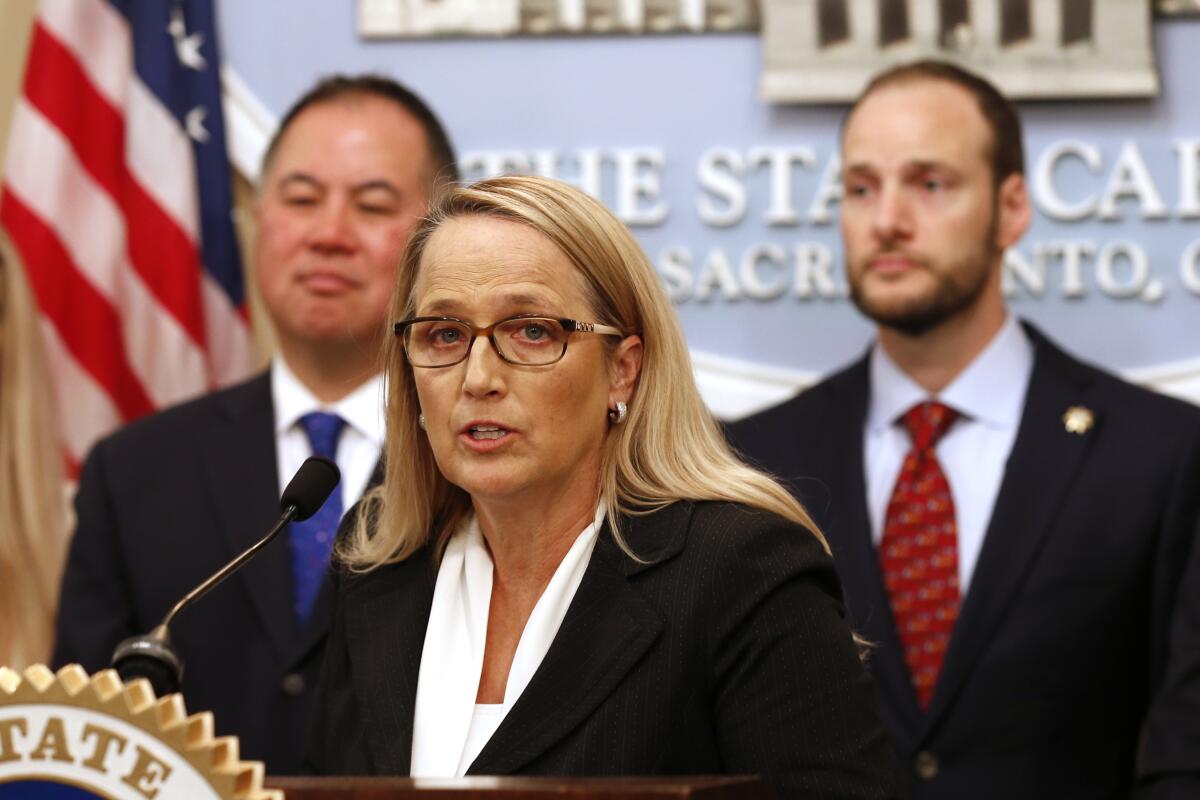Opinion: Is California’s most progressive district attorney a Republican?

- Share via
This is the second in a series of articles about the Los Angeles County district attorney’s race.
Five minutes into my meeting with the district attorney of San Joaquin County, I found myself asking a question to which I already knew the answer. But I couldn’t help myself.
“But wait,” I said. “You’re a Republican, right?”
I had gone to Stockton, in the Central Valley about an hour and a half’s drive east of San Francisco) to speak with Dist. Atty. Tori Verber Salazar in an effort to figure out what a “progressive prosecutor” is. That overused term has become a feature of the current Los Angeles County contest between incumbent Jackie Lacey and George Gascón, and although the Los Angeles Times has since endorsed Gascón, this trip to the Central Valley took place a year ago, when I and my Times editorial board colleagues back in L.A. were still trying to navigate the meaning of this race. It was pre-COVID-19 and pre-George Floyd. Gascón had just resigned his post as San Francisco district attorney and had not yet announced his challenge to Lacey — but pretty much everyone knew it was coming.
Jackie Lacey became L.A. County district attorney in 2012 after winning election to an open seat — a rarity over the last century.
As I walked into her office, Verber Salazar grabbed her car keys, turned me around and marched me back toward the door.
“We can sit in here and talk,” she said, although we were already out the door, “or we can go take a look at the kinds of things we do.”
I was game. Seated in her SUV, I figured we were on our way to the county jail, or maybe a juvenile probation camp. As the elected criminal prosecutor for the county that includes deeply troubled Stockton, she might traditionally have described her job as putting away people who harm others.
But she was talking instead about how the law-and-order, tough-on-crime model failed victims and also perpetrators, who too often go on to experience more failure and inflict more harm. And she was driving not toward the jail but to homeless encampments perched alongside dry canals, and from there to housing projects and family care centers.
“We became a system that was just processing cases,” she said, as we drove slowly past a homeless encampment. “We never really taught the importance of data and how it can drive decision making. Data can raise red flags to show when you’re implementing things in a discriminatory manner, or getting discriminatory consequences that greatly outweigh the harms caused” by the crimes.
Verber Salazar grew up in South Stockton amid social breakdown, unfathomable pollution and violent crime that makes her town one of the most dangerous places in California. For most of her more than 30 years in the D.A.’s office, she said, prosecutors didn’t stop to think about whether their work was healing the community’s deep wounds, so they weren’t making it any less likely that people would commit new crimes and create new trauma.
“At times we weren’t even doing justice,” she said. “We were just doing what we were told to do and what had always been done. And we didn’t have the data to reflect back and turn into information. And we weren’t challenging ourselves to think, ‘Is this really working?’ When 70% of people get out of prison and then go back, you know that incarceration isn’t working.”
One more time, just to be sure: You’re a Republican, right?
She is. Lifelong, unapologetic, and a bit impatient at the notion that Republican district attorneys are less interested than their Democratic counterparts in a justice system that focuses on data and workable, effective alternatives to prosecution and incarceration.
That’s one of the difficulties and, I think, inaccuracies in the label “progressive prosecutor.” The term “progressive” has meant many things over the years, but in the context of the criminal justice system it has come to mean a set of values and practices somewhat to the left of “liberal.” In 2016, the year Donald Trump was elected president, voters in several jurisdictions elected district attorneys on decidedly non-Trumpian platforms that included not seeking the death penalty, eliminating racial bias from prosecution and sending fewer people to prison. And, yes, most of those new chief prosecutors were Democrats.
They included Kim Foxx in Cook County, Ill. (Chicago), Kimberly Gardner in St. Louis and Aramis Ayala in Orlando, Fla. Before this big wave, Marilyn Mosby was elected in Baltimore, and a year after, Rachael Rollins in Suffolk County, Mass. (Boston and environs). Many of those prosecutors became the first women and the first Black people or both to lead their offices, and it stands to reason that they might have a particular perspective on a criminal justice system that disproportionately incarcerates Black people and perpetuates a strain on Black families, homes and neighborhoods already suffering from disproportionate crime.
In that sense, many of the best-known lawyers in the group could be said to follow in the footsteps not of self-described progressive prosecutor Gascón, but of Lacey, a Democrat who, when she won election in 2012, became the first woman and first African American to be elected D.A. in Los Angeles County, the nation’s largest prosecutorial jurisdiction.
But the progressive (or “21st century,” or “reform,” or “modern”) prosecutor movement is not securely tied to gender, race or political party. In Wisconsin, Winnebago County Dist. Atty. Gossett, a Republican, is sometimes deemed part of the movement for policies like not challenging the pretrial release from jail of people accused of low-level offenses on weekends and holidays. By demanding neither bail nor jail, Gossett deviates from the traditional tough-on-crime outlook, at least in the pretrial phase.
And Verber Salazar, elected San Joaquin County district attorney in 2015, is seeking to reinvent her office by focusing on the numbers and how they can help create practices that lower recidivism and victimization.
During our visit she made sure to sit me down with the county’s chief probation officer and several Superior Court judges, all of whom displayed the zeal of the converted when talking about new ways to get better outcomes from accused offenders. And always, data. Collect the numbers, analyze them, let them inform your decisions.
San Joaquin County was long a solidly conservative place, dominated by agriculture and, because of its position at the south end of the Sacramento-San Joaquin River Delta, inland shipping.
In recent decades, though, as housing costs have risen in the liberal Bay Area, more commuters have moved into the county and have brought their politics with them. Tracy is now practically part of the East Bay. Lodi, once a backwater and the butt of jokes, now vies for wine snobs with Napa and Sonoma. The county, once solid red, is now purple, with a strong and vocal contingent of Trump supporters and, in Stockton, voters who elected Michael D. Tubbs, the city’s first Black mayor and a man who earned praise and blistering criticism by championing a pilot basic-income program. The D.A. runs countywide and must get support from multiple parts of the political spectrum.
Verber Salazar said that when trying to reinvent how she approaches her job — focusing on outcomes for victims, perpetrators and communities — she got little help from the California District Attorneys Assn. or its elected D.A. members. She got help, she said, from San Francisco, and George Gascón.
“Some people say, because I’m a Republican, they think I’ve gone light on crime,” Verber Salazar told me. “And I haven’t. We had a 40% drop in homicide last year,” meaning 2018, “and a 31% drop in violent shootings. We get there by looking at the numbers, paying attention and talking to each other.”
I asked Verber Salazar about the coming D.A. race in L.A., and she nodded. Los Angeles County accounts for about a third of everything in California — crimes, victims, defendants, inmates.
“You’re the mother ship,” she said. “What happens in L.A. affects us. We’re all watching that race closely.”
More to Read
A cure for the common opinion
Get thought-provoking perspectives with our weekly newsletter.
You may occasionally receive promotional content from the Los Angeles Times.












